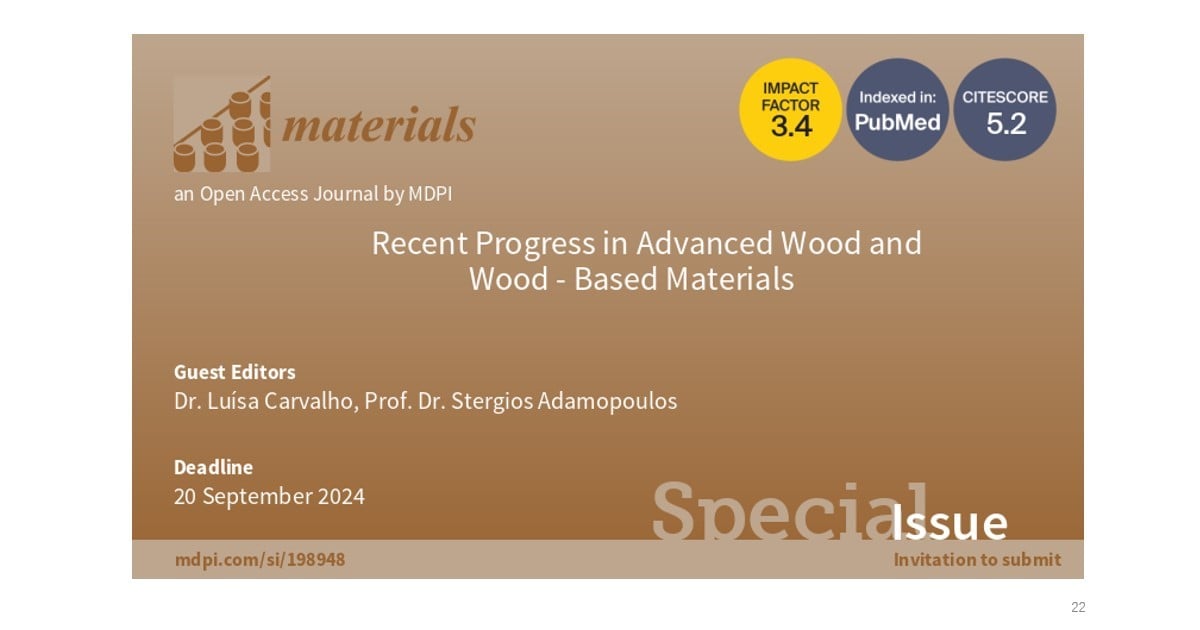Recent Progress in Advanced Wood and Wood-Based Materials
A special issue of Materials (ISSN 1996-1944). This special issue belongs to the section "Advanced Composites".
Deadline for manuscript submissions: closed (20 September 2024) | Viewed by 3520

Special Issue Editors
Interests: wood adhesives; wood-based panels (process modeling, formaldehyde and VOCs emissions); high-pressure laminates; wood machining/finishing; wood-plastic composites and circular economy
Interests: wood products; wood technology; adhesives for wood composites; sustainable wood composites; recycling
Special Issues, Collections and Topics in MDPI journals
Special Issue Information
Dear Colleagues,
Wood-based composites are composite materials that combine wood or other lignocellulosic materials, in various shapes and sizes, with a binder, generally a thermosetting resin, and which have a wide range of physical properties and mechanics. They emerged as an alternative to solid wood, have a lower cost, greater versatility in volume and shape, enhanced dimensional stability, and more uniform mechanical behavior. They have environmental advantages, as they use raw materials from renewable and recyclable sources, such as wood, and absorb CO2 from the atmosphere, helping to mitigate climate change. In the last decades, environmental regulations, the increase in sustainability of these products, the constraints in the availability of wood raw materials, the introduction of new functionalities and better mechanical performance for structural applications in construction or aesthetic performance for use in furniture, were driving forces for several emerging solutions and the arising of new challenges.
This Special Issue will present the most recent advances on wood-based materials, focusing: decrease of formaldehyde and VOCs emissions, the development of bio-adhesives while maintaining the physico-mechanical properties, the use of alternative lignocellulosic raw-materials from agro-industry, the incorporation of recycled wood or waste from other industries as textile fibers, using of circular economy approaches, the incorporation of nano-additives for new functionalities, dyeing in the bulk for new aesthetics, improved reaction to fire, the possibility of shaping and molding with the combination of thermoplastics, better machinability, new solutions for lightweight composites, composite insulation, and non-destructive testing (e.g., NIR).
Dr. Luísa Carvalho
Prof. Dr. Stergios Adamopoulos
Guest Editors
Manuscript Submission Information
Manuscripts should be submitted online at www.mdpi.com by registering and logging in to this website. Once you are registered, click here to go to the submission form. Manuscripts can be submitted until the deadline. All submissions that pass pre-check are peer-reviewed. Accepted papers will be published continuously in the journal (as soon as accepted) and will be listed together on the special issue website. Research articles, review articles as well as short communications are invited. For planned papers, a title and short abstract (about 250 words) can be sent to the Editorial Office for assessment.
Submitted manuscripts should not have been published previously, nor be under consideration for publication elsewhere (except conference proceedings papers). All manuscripts are thoroughly refereed through a single-blind peer-review process. A guide for authors and other relevant information for submission of manuscripts is available on the Instructions for Authors page. Materials is an international peer-reviewed open access semimonthly journal published by MDPI.
Please visit the Instructions for Authors page before submitting a manuscript. The Article Processing Charge (APC) for publication in this open access journal is 2600 CHF (Swiss Francs). Submitted papers should be well formatted and use good English. Authors may use MDPI's English editing service prior to publication or during author revisions.
Keywords
- wood-based composites
- bio-adhesives
- green lignocellulosic composites
- natural fiber composites
- formaldehyde and VOC emissions
- alternative furnishing materials
- nano-additives
Benefits of Publishing in a Special Issue
- Ease of navigation: Grouping papers by topic helps scholars navigate broad scope journals more efficiently.
- Greater discoverability: Special Issues support the reach and impact of scientific research. Articles in Special Issues are more discoverable and cited more frequently.
- Expansion of research network: Special Issues facilitate connections among authors, fostering scientific collaborations.
- External promotion: Articles in Special Issues are often promoted through the journal's social media, increasing their visibility.
- Reprint: MDPI Books provides the opportunity to republish successful Special Issues in book format, both online and in print.
Further information on MDPI's Special Issue policies can be found here.







